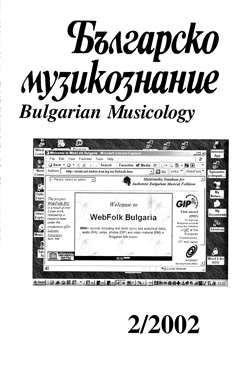Жанрови модели в българското композиторско творчество през последните три десетилетия
Genre Models in Bulgarian Composers' Works During the Last Three Decades
Author(s): Elisaveta Valchinova-ChendovaSubject(s): Music
Published by: Институт за изследване на изкуствата, Българска академия на науките
Summary/Abstract: 1. Characteristic genre features of contemporary Bulgarian music The individual author’s approach determines, on the one hand, the lack or the level of the specific “primary” refraction of the phenomena from the world musical practice, on the other hand - their secondary re-creation through al ready established traditions in Bulgarian music. Generally, these trends do not exist in pure form - their interweaving leads to various artistic results. Conscious deviation from the traditional genre code is characteristic for a number of the leading models. The genre model that has been accepted as a basis may belong to forms recognized for centuries but it may have been created in our lifetime. In this respect, the original author’s genre code mostly bears the sign of innovation. The attitude to Bulgarian musical folklore is an opportunity of joining Bulgarian authors to the European tendencies from the second half of XX century and achieving creative identity in the post-modern situation of disintegrating vanguard. The transformation of the idea of sound and musical time reflects upon the preservation/renovation of genre. The composition experiments with time continuum and the transformations of sound affect both the increase in the possibilities of acoustic instruments and the sounds obtained through the new electro acoustic technique. Electronic music is particularly interesting a new genre trend. The planning of composers’ work in the past and at present is evident in the great variety of composition solutions of the members of the Union of Bulgarian Composers, presented at the annual fest “New Bulgarian Music”. The presence of tradition is supported by the authors through a conscious approach to continuity in which the system of genres is essential. 2. On some genre approaches The chamber character of the opera genre is characteristic for the musical stage works. The relation with the symphonic orchestra and chamber-instrumental principles of development and the interaction with cantata-oratorio, with conventional theatre are increased. Chamber operas and works for children predominate. The contemporary dance theatre and vanguard theatre offers interesting genre solution. The popular musical stage genres are based on the comparison with world genre models and stylistic standards, adopted in this country through performance and mass media practices. In orchestra and instrumental music a tendency is evident towards a chamber character of symphonic thought. Symphonies for chamber, string and wing orchestras, concertos for orchestra have become genre models. Another trend is “the big symphony’. In a number of works, however, it is very difficult to point out the exact genre formulation characteristic for them, although their names suggest their genre belonging. 3. Interpretations of gen re models in descriptions of Bulgarian composers’ works The structuring of the works according to their genre features assumes the existence of a theoreti
Journal: Българско музикознание
- Issue Year: 2002
- Issue No: 2
- Page Range: 16-61
- Page Count: 46
- Content File-PDF

